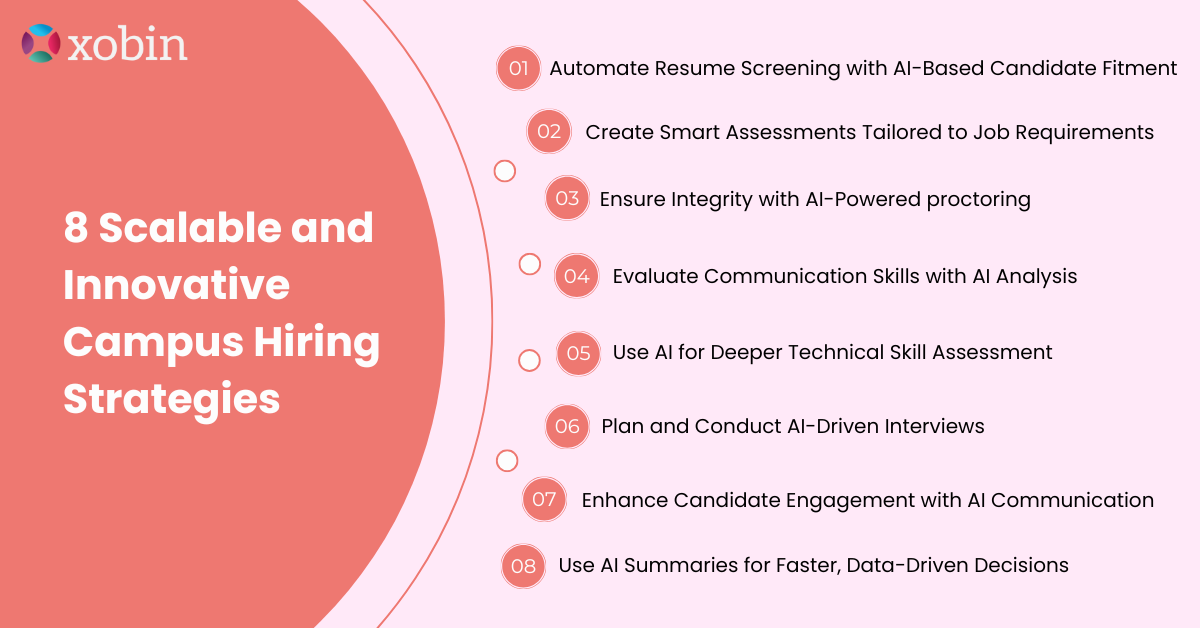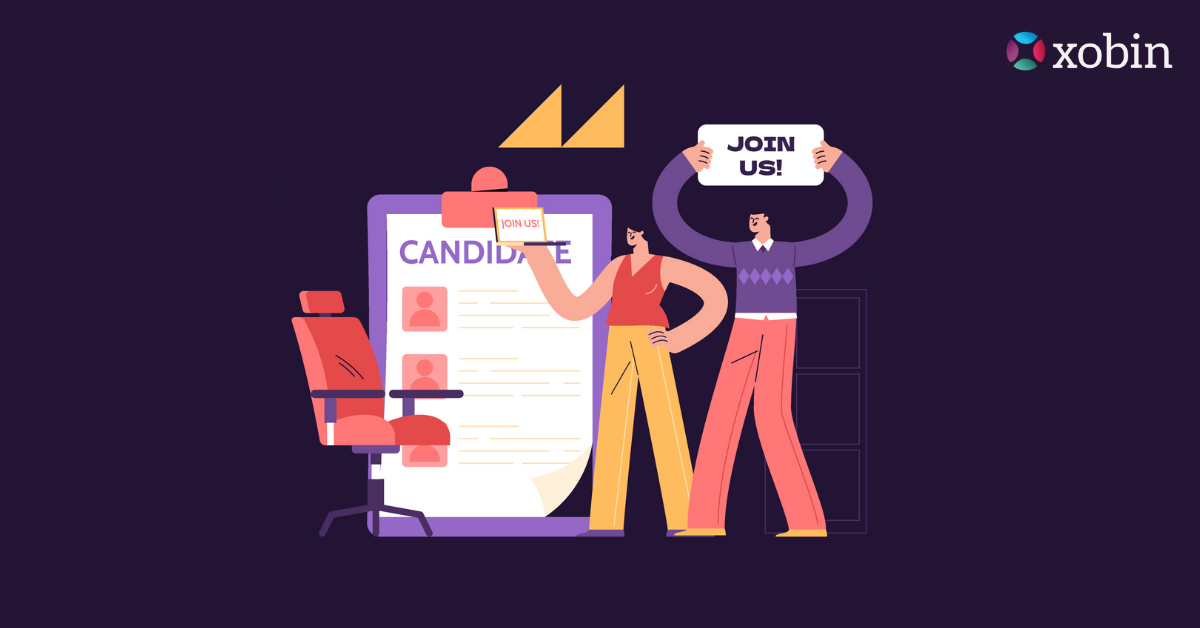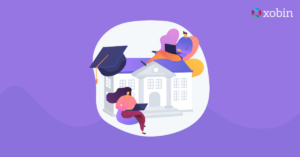Campus recruitment is undergoing a transformative shift. The days of physical job fairs, paper resumes, and manual candidate evaluations are fading. In their place, forward-thinking companies are adopting scalable campus recruitment strategies powered by AI and automation to access talent across geographies.
Table of Contents
But how do you build an innovative campus recruitment strategy plan that is creative, innovative and scalable? Below, we explore actionable strategies that every recruiter should implement to modernize their campus hiring process, all while ensuring simplicity, inclusivity, and precision.
TL;DR – Key Takeaway!
- Campus recruitment strategies are evolving, and manual processes are being replaced by AI-driven automation for faster, smarter recruitment.
- Automate resume screening with AI to quickly score and shortlist the best-fit campus candidates from large applicant pools.
- Use AI-based job description-driven assessments to create role-specific assessments and skill-based tests at scale that accurately evaluate candidate skills and reduce turnaround time.
- Maintain hiring integrity through advanced AI proctoring that tracks eye movements and screen activity and prevents cheating.
- Evaluate communication skills objectively with AI tools analyzing clarity, articulation, and multilingual fluency.
- Go beyond basic coding tests with AI-driven deeper code analysis assessing quality, modularity, and real-world programming skills for true tech talent discovery.
- Run AI-driven interviews 24/7 with Agentic Interviews and auto-generated interview plans tailored to the job role.
- Boost candidate engagement using AI-driven personalized voice outreach, increasing response rates and positive candidate experience.
- Leverage AI-generated instant performance reports to make faster, data-backed hiring decisions without sifting through volumes of data.
What is Campus Recruitment?
Campus recruitment is a strategic approach where organizations engage with universities and colleges to identify, attract, interview and hire high-potential graduates. It represents a critical talent pipeline, enabling early access to future-ready professionals. With the right strategy, campus hiring accelerate long-term workforce planning, fosters innovation, and builds a competitive edge by securing agile, diverse, and culturally aligned talent before they enter the broader job market.
8 Innovative Campus Hiring Strategies

1. Automate Resume Screening with AI-Based Candidate Fitment
One of the most time-consuming tasks in campus hiring is sifting through thousands of resumes. Manual screening is not only inefficient but also prone to human bias and error. Here, AI-based candidate resume screening comes to the rescue.
Using advanced resume parsing and fitment scoring, recruiters can automate the evaluation process. The AI scans resumes, analyzes skills, experience, and education, and then provides a precise fitment score for each candidate. This score reflects how well a candidate matches your job requirements.
What’s more, these AI tools generate rich metadata like tailored interview questions and highlight reels of relevant skills. As a result, recruiters spend less time sorting resumes and more time engaging with truly qualified candidates.
Adopting such AI automation makes your campus recruitment strategies scalable by handling large applicant pools efficiently without compromising quality.
2. Create Smart Assessments Tailored to Job Requirements
Developing assessments that accurately evaluate candidates’ capabilities is key to effective hiring. However, creating customized tests for every role can be resource-intensive.
Thankfully, AI-driven JD-based assessment building can simplify this. By simply uploading your job description, the AI carefully analyzes the primary and secondary skills required. It then generates a well-matched assessment tailored to those needs.
This approach ensures that every evaluation is rigorous, relevant, and aligned with job expectations. It also reduces the turnaround time for creating assessments, allowing you to scale hiring efforts across multiple campuses simultaneously.
Moreover, smart assessments contribute to better candidate experiences, as tests feel more personalized and meaningful.
3. Ensure Integrity with AI-Powered proctoring
When conducting online assessments and interviews, maintaining integrity is crucial. Cheating or dishonest behavior can severely impact hiring decisions and employer reputation.
Advanced AI-Based Assessment and Interview Proctoring solves this problem by monitoring candidate behavior during tests. Technologies like face tracking, eye movement analysis, and off-tab detection help detect suspicious activities such as looking away frequently or using unauthorized materials.
Additionally, the system records both screen and voice activity for later review. This comprehensive monitoring builds confidence that every candidate’s results are authentic and reliable.
By integrating proctoring into your campus hiring strategy, you protect the quality of hires and uphold fairness across all candidates.
4. Evaluate Communication Skills with AI Analysis
Strong communication skills are fundamental, especially for fresh graduates entering professional environments. Yet, assessing these skills manually can be subjective and inconsistent.
AI-powered communication checkers bring objectivity and precision to this evaluation. These tools analyze candidate speech or writing for clarity, articulation, grammar, and overall effectiveness. They support multiple languages, including English and 15 others, enabling global recruitment efforts.
By incorporating communication assessment into your hiring workflow, you ensure that selected candidates can thrive in client-facing or collaborative roles.
Besides, this data-driven approach allows recruiters to benchmark candidates and make more informed decisions.
5. Use AI for Deeper Technical Skill Assessment
For technical roles, it is critical to look beyond mere correctness in coding tests. Real-world performance depends on code quality, modularity, and problem-solving approach.
AI-enabled Deeper Code Analysis evaluates submissions across 40+ programming languages. It assesses factors such as readability, efficiency, and logical structure, offering a holistic view of a developer’s skill set.
Implementing such sophisticated coding evaluations enhances your campus recruitment strategies by identifying truly talented programmers who can contribute effectively from day one.
This method reduces false positives that can occur with simple pass/fail coding challenges, ensuring long-term hires.
6. Plan and Conduct AI-Driven Interviews
Preparing for interviews can be resource-intensive and time-consuming. Fortunately, AI assists in streamlining this process with interview plan generators.
By providing a job description, recruiters receive an instant interview plan highlighting primary, secondary, and behavioral skills to evaluate. The AI also suggests curated interview questions aligned with each skill area.
Additionally, AI-powered Agentic Interviews can autonomously conduct initial technical interviews 24/7. Candidates answer conceptual and technical questions within integrated text and code editors. The AI instantly evaluates their responses, providing unbiased, consistent feedback.
Such innovations free up your hiring teams to focus on higher-value conversations and final decision-making.
7. Enhance Candidate Engagement with AI-Powered Communication
Maintaining regular contact with candidates throughout the hiring journey boosts engagement and reduces drop-offs. AI-powered Candidate Telephonic Outreach helps automate personalized voice calls tailored to candidates’ regional accents.
Whether sending assessment reminders, interview schedules, onboarding instructions, or background verification prompts, AI-driven voice calls improve response rates and speed up workflows.
Incorporating this feature into your campus hiring strategy helps maintain a seamless candidate experience, reflecting positively on your employer brand.
8. Use AI Summaries for Faster, Data-Driven Decisions
Recruiters often juggle extensive data from assessments, interviews, and feedback forms. Sifting through this information can delay hiring decisions.
AI-generated Instant Performance Snapshots condense candidate evaluations into concise 3-4 line summaries. These snapshots highlight key capabilities and overall performance, enabling recruiters to grasp critical insights quickly.
With these AI-powered summaries, decision-making becomes faster, data-driven, and more accurate, which is essential for scaling campus recruitment.
Why is Xobin Your Ultimate Campus Recruitment Partner?
In the age of automation, Xobin stands out as the most comprehensive, AI-driven hiring platform built for scale, speed, and precision. From smart resume screening to autonomous interviews and real-time proctoring, Xobin offers end-to-end automated recruitment solutions tailored for modern campus hiring. Every feature is designed to minimize manual effort, reduce bias, and deliver actionable insights making your hiring process faster, smarter, and more reliable.
If you’re ready to transform your campus recruitment and consistently hire the best fresh talent, it’s time to explore how Xobin can be your trusted hiring partner. Book a personalized demo today and experience the future of campus hiring.
Frequently Asked Questions (FAQs)
1. What are the best practices for scalable campus hiring?
Leverage AI tools for screening, automate interview processes, and use performance analytics. Combine that with strong employer branding and gamified assessments for best results.
2. How can AI help in campus recruitment?
AI helps automate resume screening, build assessments, conduct interviews, evaluate code and communication skills, and generate performance summaries.
3. Can campus recruitment strategies be customized for different roles?
Yes. AI-based systems can create assessments tailored to each job role based on its JD, ensuring every test is highly relevant.
4. What are Agentic Interviews?
Agentic interviews are AI-driven, autonomous interviews conducted without human intervention. They allow for scalable, 24/7 early-stage screening.
5. How does virtual outreach improve campus recruitment?
Virtual outreach through AI voice calls ensures timely communication, improves engagement, and enhances the candidate experience.






